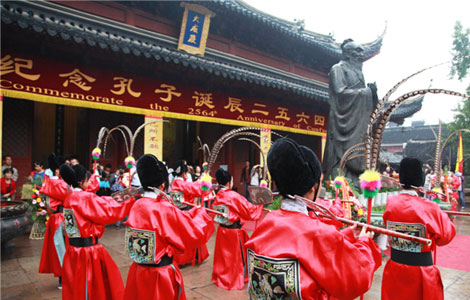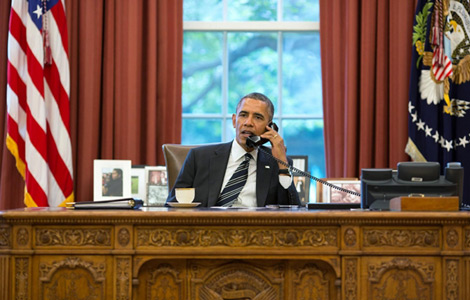Overseas Chinese entrepreneurs connect with reform
Updated: 2013-09-27 10:29
(Xinhua)
|
||||||||
CHENGDU -- Not just bound by cultural tradition, overseas Chinese entrepreneurs have been closely following China's latest reform and development and are actively seeking opportunities during the economic transition.
For more than 3,000 entrepreneurs from 105 countries and regions, the 12th World Chinese Entrepreneurs Convention is more like a homecoming party.
"The home of overseas Chinese entrepreneurs is China. The broad and profound Chinese tradition is our great spiritual wealth and source of wisdom," said Dhanin Chearavanont, a Chinese Thai and chair of the multinational Charoen Pokphand Group, at Wednesday's opening ceremony.
Overseas Chinese entrepreneurs were among the first to invest in the mainland three decades ago during the initial years of China's reform, thanks to their better understanding of China and sensitivity to the country's changes.
As reform cranks up and rebalancing economic structure toward a consumption-led pattern becomes the order of the day, these business people find China's future even more promising.
"China's development in the next decade will be several times that of the last sixty years," said Dhanin, who is considering setting up a fund to facilitate investment in China and help Chinese entrepreneurs go global.
In his congratulatory letter to convention which closed on Thursday in Chengdu, capital of Sichuan province, Chinese President Xi Jinping said overseas Chinese entrepreneurs are offered a "grand stage" to realize their visions during the great renewal.
China's top political advisor, Yu Zhengsheng, also said that a prosperous and stable China will bring more opportunities for the world and for overseas Chinese entrepreneurs in particular.
"The new leadership is very open-minded," said Lin Guangyou, president of Yihai Property Holdings Co Ltd based in Hong Kong.
The government has been easing administrative procedures and Lin expects a fairer business environment in the future.
Richard K. Wong, president of World Chinese Business Association of Canada, said overseas Chinese entrepreneurs can be bridges between China and the rest of the world in technology, finance and education.
Wong also hoped the latest reforms would boost the private economy, meaning more opportunities for overseas Chinese businesses.
Urbanization, a major focus of these reforms, caught the attention of Tu Haiming, a Shanghai-born businessman from Hong Kong and vice president of China Overseas Chinese Entrepreneurs Association.
Tu said the decision to combine expansion of domestic demand with urbanization is a step in the right direction, while suggesting that urbanization should be about both environmental protection and technological development.
China's economic growth slowed to 7.5 percent in the second quarter from 7.7 percent in the first three months, but recent economic indicators have been better than expected, including manufacturing activity and foreign trade, so there is plenty of evidence of a firming Chinese economy.
"We are very confident about China's future economic trend," said Fu Xumin from the Netherlands who manufactures electronic lighting products.
The two-digit economic growth is no longer on the cards, but growth between 7 percent and 8 percent in the next one or two decades is not out of question, Fu said.

 American batman soars through Chinese mountain
American batman soars through Chinese mountain
 Kenya mourns victims of Westgate mall attack
Kenya mourns victims of Westgate mall attack
 Home schooling popular with Chinese parents
Home schooling popular with Chinese parents
 Royal Mint coins to mark Prince George christening
Royal Mint coins to mark Prince George christening
 29th Golden Rooster Awards
29th Golden Rooster Awards
 China marks birthday anniversary of Confucius
China marks birthday anniversary of Confucius
 Obama, Iran's Rouhani hold historic phone call
Obama, Iran's Rouhani hold historic phone call
 Li Na learns from her past
Li Na learns from her past
Most Viewed
Editor's Picks

|

|

|

|

|

|
Today's Top News
Special PLA medical squad starts service
US House votes to delay Obamacare
US spy agency mapped people's behavior -NYT
China won't seek hegemony, FM tells UN
China on yellow alert as Typhoon Wutip nears
Xi to visit attend APEC summit
East China cities debut 4G phones
Shanghai FTZ begins operation
US Weekly

|

|







